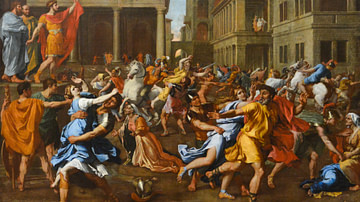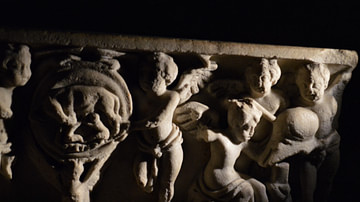Illustration
Painting by Jacques-Louis David (1748–1825), oil on canvas, 1799. On display at the Louvre Museum, Paris, France.
The Abduction (or Rape) of the Sabine Women is an episode in the legendary history of Rome, traditionally said to have taken place in 750 BC, in which the first generation of Roman men acquired wives for themselves from the neighboring Sabine families.
Fearing the emergence of a rival society, the Sabines refused to allow their women to marry the Romans. Consequently, the Romans planned to abduct Sabine women, during a festival of Neptune Equester and proclaimed the festival among Rome's neighbours. At the festival Romulus gave a signal, at which the Romans grabbed the Sabine women and fought off the Sabine men. The indignant abductees were soon implored by Romulus to accept Roman husbands.
In the ensuing war, once Rome gained the upper hand, the Sabine women intervened and implored the two warring parties to reconcile.
[They] went boldly into the midst of the flying missiles with disheveled hair and rent garments. Running across the space between the two armies they tried to stop any further fighting and calm the excited passions by appealing to their fathers in the one army and their husbands in the other not to bring upon themselves a curse by staining their hands with the blood of a father-in-law or a son-in-law, nor upon their posterity the taint of parricide. "If," they cried, "you are weary of these ties of kindred, these marriage-bonds, then turn your anger upon us; it is we who are the cause of the war, it is we who have wounded and slain our husbands and fathers. Better for us to perish rather than live without one or the other of you, as widows or as orphans." (Livy: The Rape of the Sabines)
Recounted by Livy and Plutarch (Parallel Lives II, 15 and 19), it provided a subject for Renaissance and post-Renaissance works of art that combined a suitably inspiring example of the hardihood and courage of ancient Romans with the opportunity to depict multiple figures, including heroically semi-nude figures, in intensely passionate struggle.
(Text from Wikipedia, edited)
Cite This Work
APA Style
David, J. (2013, March 25). The Intervention of the Sabine Women. World History Encyclopedia. Retrieved from https://www.worldhistory.org/image/1125/the-intervention-of-the-sabine-women/
Chicago Style
David, Jacques-Louis. "The Intervention of the Sabine Women." World History Encyclopedia. Last modified March 25, 2013. https://www.worldhistory.org/image/1125/the-intervention-of-the-sabine-women/.
MLA Style
David, Jacques-Louis. "The Intervention of the Sabine Women." World History Encyclopedia. World History Encyclopedia, 25 Mar 2013. Web. 28 Mar 2025.







